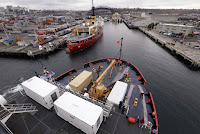“We simply cannot allow the corporate greed of the coal, oil, and gas industries to determine the future of humanity,” said DiCaprio last week while at Davos, Switzerland, where some 2,500 top global business leaders, politicians, and intellectuals gathered to discuss politics, economics, and social issues.
Fossil fuels must be kept in the ground to avoid catastrophic climate change, he continued. “Enough is enough. You know better. The world knows better.”
But while DiCaprio was cheered Wednesday as he stepped off the stage with his Crystal award, the international business community appears interested in venturing into new areas despite potential ecological costs. In fact, a day after recognizing environmental leadership, a World Economic Forum advisory group launched the Arctic Investment Protocol, and with that came a tacit push for extracting resources from one of the least-developed areas of the world.
The Arctic Investment Protocol is a voluntary set of guidelines for nations looking to do business where diminished ice coverage from man-made climate change is allowing access to once-unreachable sea routes as well as vast mineral and fossil fuel reservoirs.
The protocol calls for building resilient societies through economic development, pursuing measures to protect the Arctic environment, and respecting and including local communities, to name a few. The Guggenheim Partners, a major global investment and financial services firm, quickly endorsed the protocol, saying the Arctic represents one of the last great economic frontiers.
With more than $240 billion in assets, Guggenheim Partners was the first major firm to endorse these guidelines. In doing so, it also gave a strong indication of where global business is headed as South America, Asia, and Africa receive increasing investment. “The Arctic Investment Protocol is an important step forward and a solid foundation upon which to build for the future,” said Scott Minerd, global chief investment officer of Guggenheim Partners, in a statement.
On the one hand, such a business trend would bring economic prosperity and infrastructure that experts say is lacking in many Arctic communities. On the other, human history shows that economic development is very often intertwined with ecological costs.
Exponential Arctic development thus raises serious environmental questions involving a region known for its fragile endemic species, where maritime environmental protection codes are in infancy, and so remote that pollution cleanup operations are difficult and costly. Not to mention the major role the Arctic plays in global climate since its already receding ice reflects a large amount of solar radiation, all while holding onto CO2 that if released would accelerate global warming.
Read more at The Arctic Is Melting and Big Business Is Chomping At The Bit to Dig In

No comments:
Post a Comment